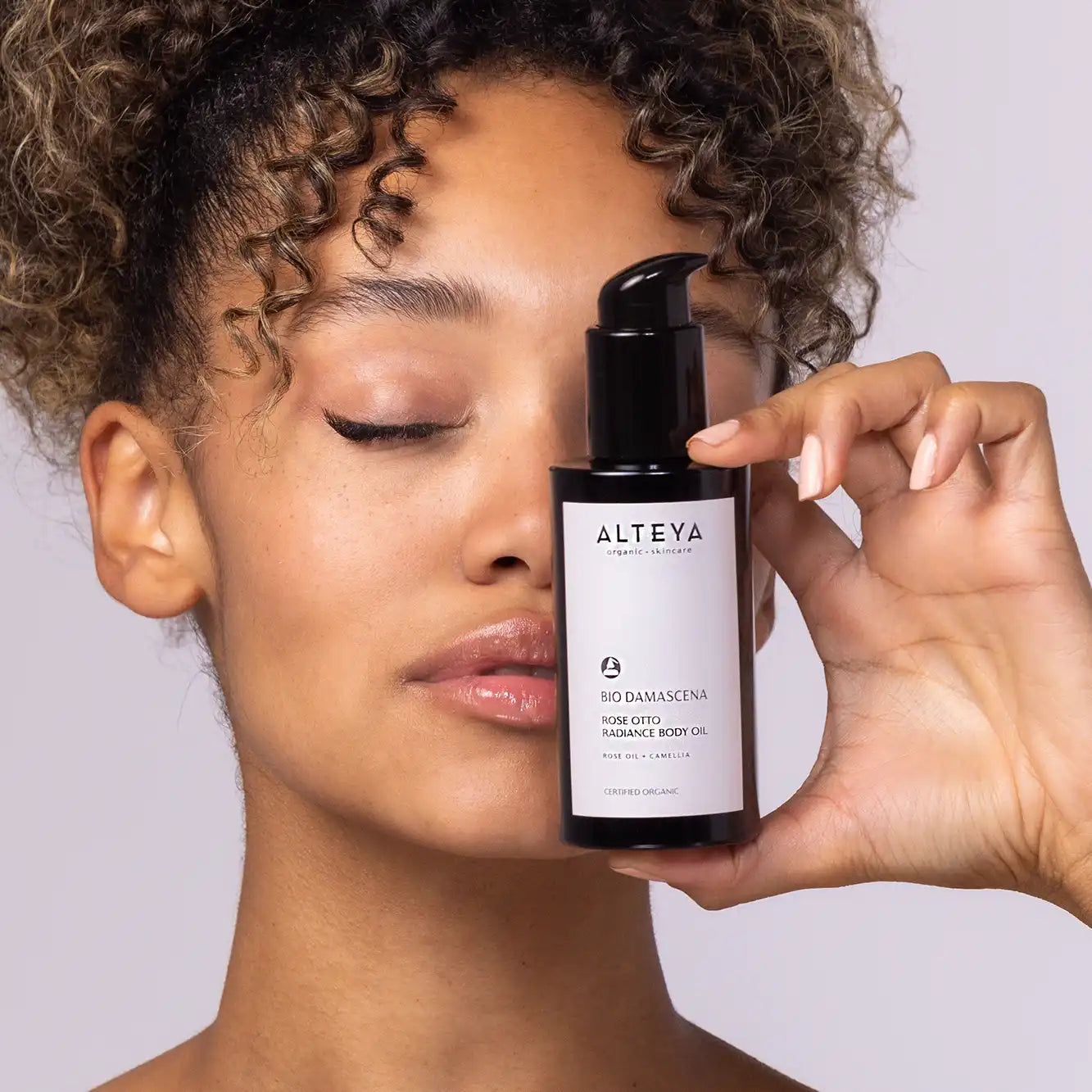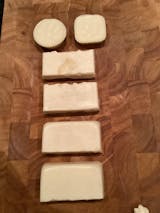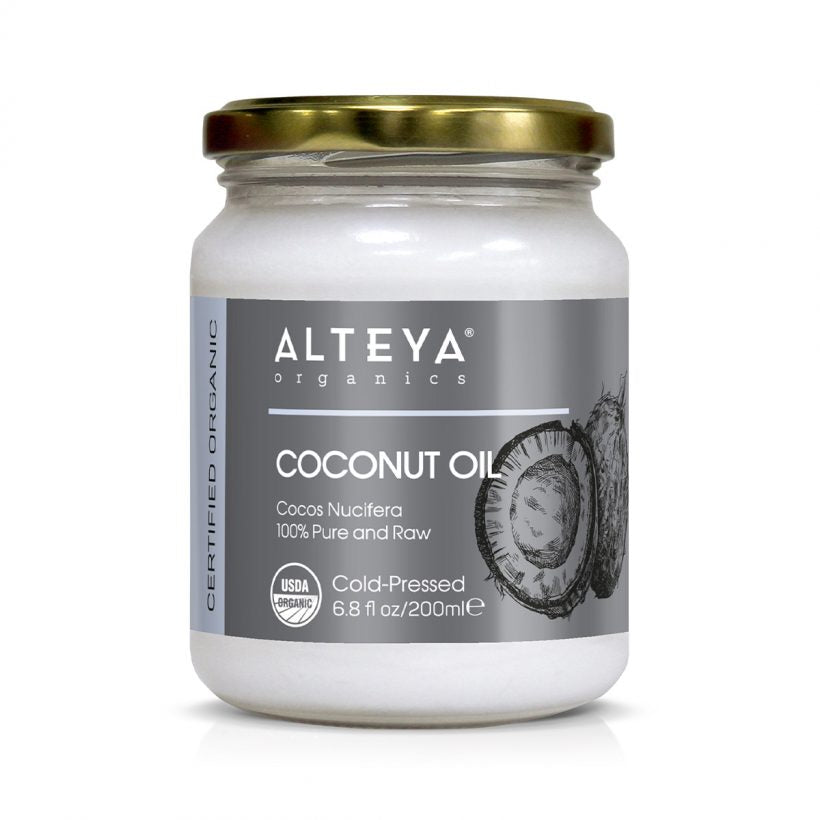
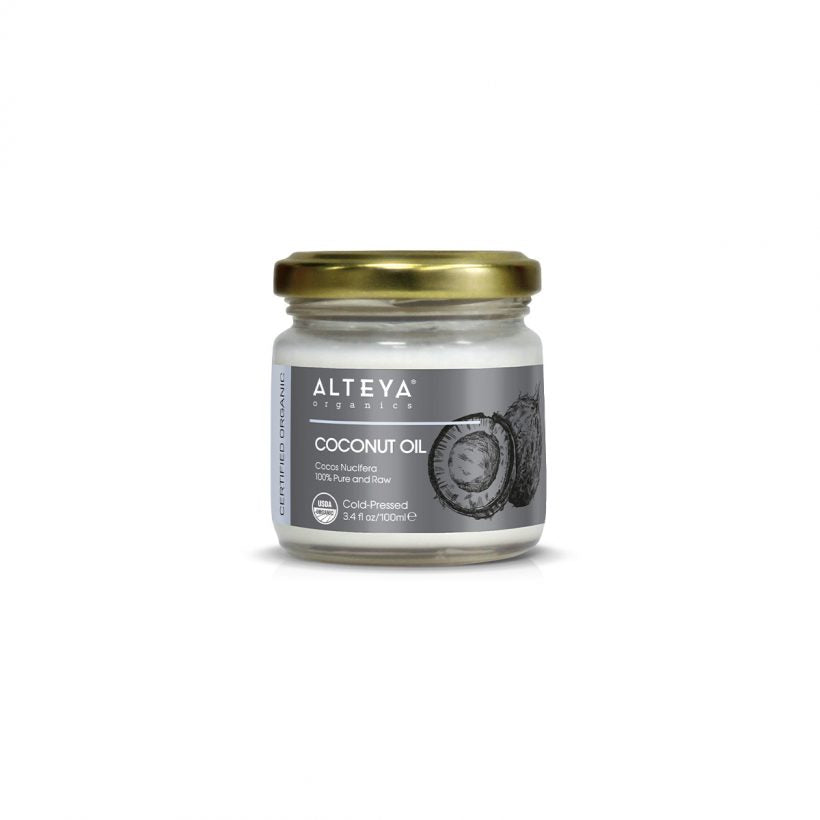
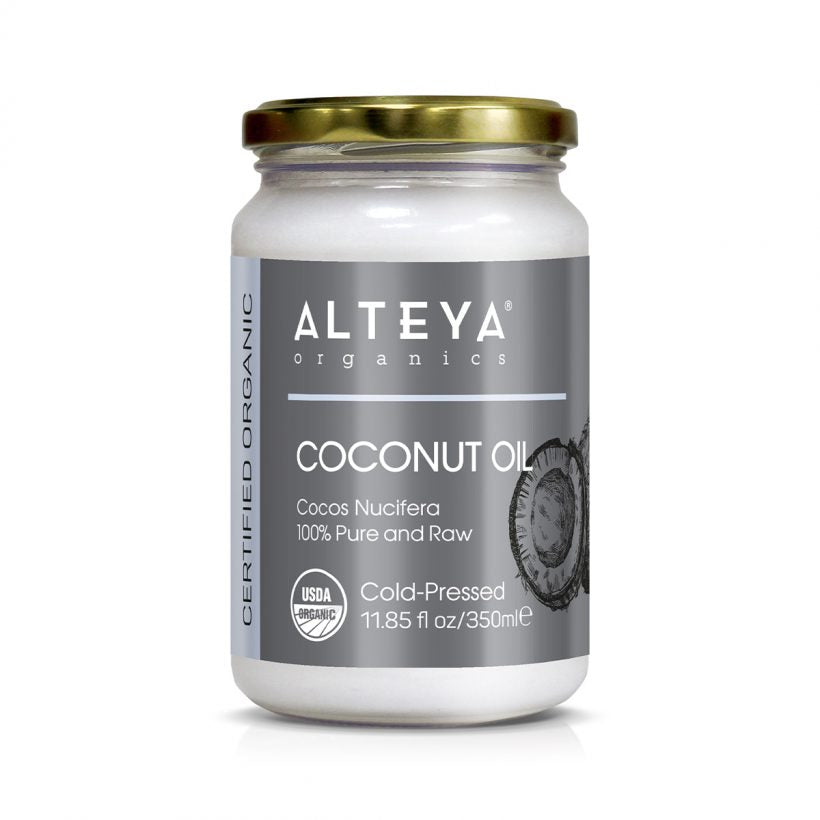
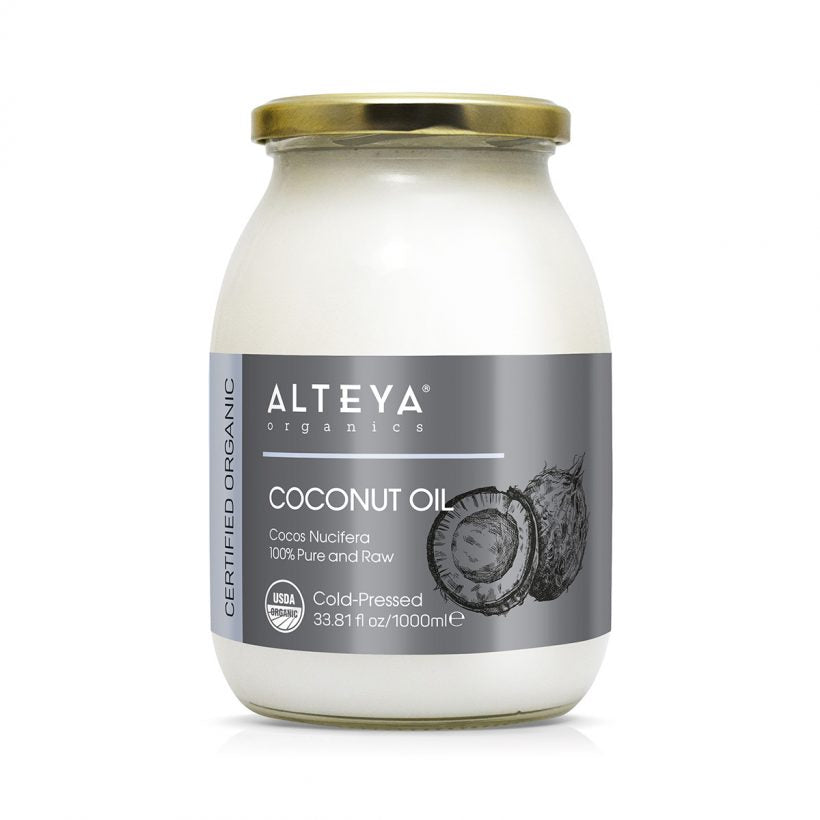
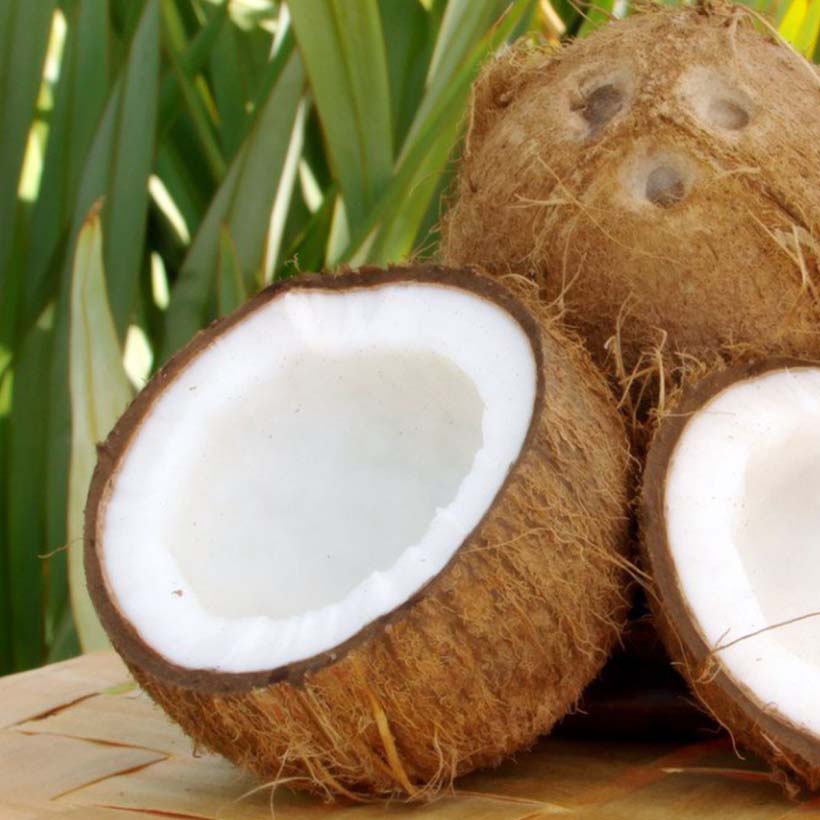

ORGANIC COCONUT OIL
Free Shipping on all orders over 69.99 Euro
Delivery 2 to 12 business days after dispatch
DESCRIPTION
/COCOS NUCIFERA/
Famous for its conditioning and moisturizing benefits, Coconut oil has deep and pleasant scent of pure coconut. This is a great oil for general moisturizing care and serves as a protective layer, helping to avoid moisture loss of skin. Coconut oil is without a doubt, the number one lather-producing agent used in soaps.
Coconut oil has snow white colour and is hard in consistency when kept at room temperature.
Extraction method: Cold Pressed
Absorption rate: Average
Aroma: Moderate
SUGGESTED USE
Scoop a pea-sized amount of Coconut oil into your palm then massage it onto your skin as it melts. The melted butter will glide on like a body oil and absorb into the skin within minutes.
Use Coconut oil on your hair as a pre-poo deep conditioning treatment – work it into your strands from roots to tips and allow to sit in your hair for an hour. Rinse out well and wash hair as normal.
Melt a tiny amount of Coconut oil between your palms, then dab it onto the tips of your hair to help moisturize and condition dry ends.
INGREDIENTS
INCI: Cocos Nucifera (Coconut) Oil*
*Certified Organic Ingredient
ADDITIONAL INFORMATION
For external use only. Keep out of reach of children. Avoid contact with eyes. If irritation occurs, discontinue use. Store in a cool, dry place, away from direct sunlight.
Choose options






Organic coconut oil from Alteya Organics
Alteya Organics’ coconut oil is 100% pure certified organic carrier oil. The coconut oil you can buy from our online store is obtained by cold pressing. Coconut oil is obtained from coconut milk extracted from the raw kernel of the coconut (Cocos nucifera). It is snow-white and solid at room temperature (up to 25°C) and has a pleasant, familiar coconut aroma....
What does certified organic coconut oil mean?
Organic coconut oil is obtained from the fruit of coconut palms grown according to organic farming standards (without synthetic fertilizers and pesticides). The coconut oil offered by Alteya Organics is USDA-certified organic, and thus meets one of the strictest standards in the world.


What is the difference between refined and unrefined coconut oil?

Refined coconut oil lacks the characteristic coconut flavor and aroma. It is made from dried coconut mass, called "copra", and not from fresh coconuts. Refined coconut oil is usually chemically processed in several steps, e.g. bleaching and deodorizing. Unrefined coconut oil, also known as "virgin" or "extra virgin", has a milky white color and carries a subtle coconut flavor and aroma that can vary depending on the manufacturer. This type of oil is not chemically processed, so more of the coconut's natural beneficial elements are preserved.
Why does coconut oil vary between liquid and solid states?
And why do crystal lumps occasionally form within it?

If you place a container of Coconut oil in warm water or near a heat source, it melts quickly. This transition between solid and liquid state doesn't affect the quality of the oil in any way.
If you place a container of coconut oil in warm water or near a heat source, it melts quickly. This transition between solid and liquid state doesn't affect the quality of the oil in any way.
When coconut oil is partially melted, you may observe small lumps. These lumps are essentially the natural crystalline structure of saturated fats when they're in an environment with a temperature close to the melting point (around 25 °C). The melting point of coconut oil can vary depending on the impurities present. Pure organic Coconut oil can remain liquid even at slightly lower temperatures due to its low impurity content.
Benefits and uses of coconut oil for the hair

1. Coconut oil for hair nourishment
It's not surprising that numerous hair care products are advertised as containing coconut oil. However, the amount contained in many of these products is minimal. In addition, conventional products often contain chemicals that can damage the hair.
Pure coconut oil contains valuable fats and minerals that are essential for beautiful hair. The idea is to apply it directly to the hair. Take a small amount of coconut oil with your fingertips and apply it to dry hair, especially the ends.
Coconut oil is ideal as a hair mask. You can apply a large amount all over your hair and leave it on for a few hours or overnight and then wash it out. This treatment will breathe new life into your hair.
2. Coconut oil to support hair growth
Coconut oil can help repair thin and damaged hair while nourishing and cleansing the scalp. This leads to a healthier, longer, and more beautiful mane. Studies have shown that using organic coconut oil for hair care reduces protein loss.
3. Coconut oil helps fight dandruff
It moisturizes dry, itchy skin and, thanks to its antimicrobial properties, is also said to help fight bacteria and fungi on the scalp that often cause dandruff.
Benefits and uses of coconut oil for the skin

1. Coconut oil as an ingredient in body oil or lotion
It has the ability to retain moisture in the skin, which is mainly due to the saturated fats it contains. These fats form a film on the skin that prevents moisture loss through the pores. This makes coconut oil a valuable addition to both homemade and store-bought body lotions.
2. Coconut oil as a base for a homemade body scrub
Mix coconut oil with coconut sugar to make a natural, homemade scrub that removes dead skin cells and moisturises the skin.
3. Coconut oil as a balm for very dry skin
Take a small amount of coconut oil and apply it to dry skin areas such as heels, elbows and knees. It will melt from the body's natural heat. Wait until it is completely absorbed.
If the skin on your hands is dry, you can lubricate it with coconut oil and then put on gloves until the product is completely absorbed. This will make your skin soft and supple again.
4. Coconut oil for treating cold sores
It contains three important fatty acids — caproic acid, caprylic acid and lauric acid— which have disinfectant and antimicrobial properties. These properties are believed to speed up the healing of cold sores, relieve pain and reduce the risk of scarring or discoloration.
5. Coconut oil as cuticle oil
Rubbing coconut oil on your cuticles softens them and makes them easier to treat afterwards. Its antimicrobial properties also help to keep germs at bay.
6. Coconut oil against stretch marks
Studies have shown that organic, unrefined coconut oil has a positive effect on skin health. According to these studies, it can stimulate collagen production in the tissue, which in turn reduces the visibility of stretch marks. Its use can also prevent the appearance of new stretch marks.
7. Coconut oil to soothe sunburn
It is claimed that coconut oil can relieve the dryness, pain and itchiness of sunburn. It is recommended to cool the skin beforehand with a cold compress or a cool shower and then apply the coconut oil after a few hours.
Benefits and uses of coconut oil for other purposes

1. As a base for making repellent
Coconut oil combined with a few drops of essential oil (e.g. lemongrass, lavender, peppermint, basil, cinnamon, etc.) is a wonderful, safe alternative to conventional repellents, which are often chemical and harmful.
2. To freshen the breath
Coconut oil is known for its breath-freshening effect, which is due to its antibacterial properties. It effectively fights the presence of harmful bacteria in the mouth and provides fresher breath.
3. In pet care
Coconut oil can be used effectively in the care of domestic dogs and cats. For pets suffering from dry, itchy skin, applying coconut oil directly to the affected areas and incorporating it into their diet can prove effective. In addition, a small portion of coconut oil in domestic cats can help hairballs to pass more easily through the gastrointestinal tract during grooming. However, it is important to use it in moderation as it has laxative properties.
4. In culinary applications
There is much debate about the use of coconut oil in cooking and its benefits to human health, but ultimately the evidence supports the benefits of coconut oil rather than its disadvantages.
5. As a substitute for coffee creamer
Recently, it has become a trend to add cow butter or coconut oil to coffee instead of sugar and/or milk. Many claim that the taste is surprisingly pleasant.
6. For sweets and desserts preparation
Most recipes for healthy desserts contain instructions for using coconut oil instead of, for example, sunflower oil. In addition, vegetarians can replace cow's milk butter with coconut oil.
7. For cooking main dishes
Those who don't shy away from the taste of coconut can successfully use coconut oil instead of other oils in the preparation of various main dishes. Unrefined coconut oil has a higher smoke point compared to some other unrefined oils (such as olive oil and sunflower oil), which means that it doesn't burn at high temperatures (up to certain degrees) and retains its beneficial properties.
To summarise, we definitely recommend exploring the effects of coconut oil by trying one or more of the suggested applications. When using it for personal use, whether externally or internally, it's advisable to opt for an unrefined organic oil of proven origin and quality.
What does certified organic coconut oil mean?
What is the difference between refined and unrefined coconut oil?
Benefits and uses of coconut oil for the hair
REVIEWS







